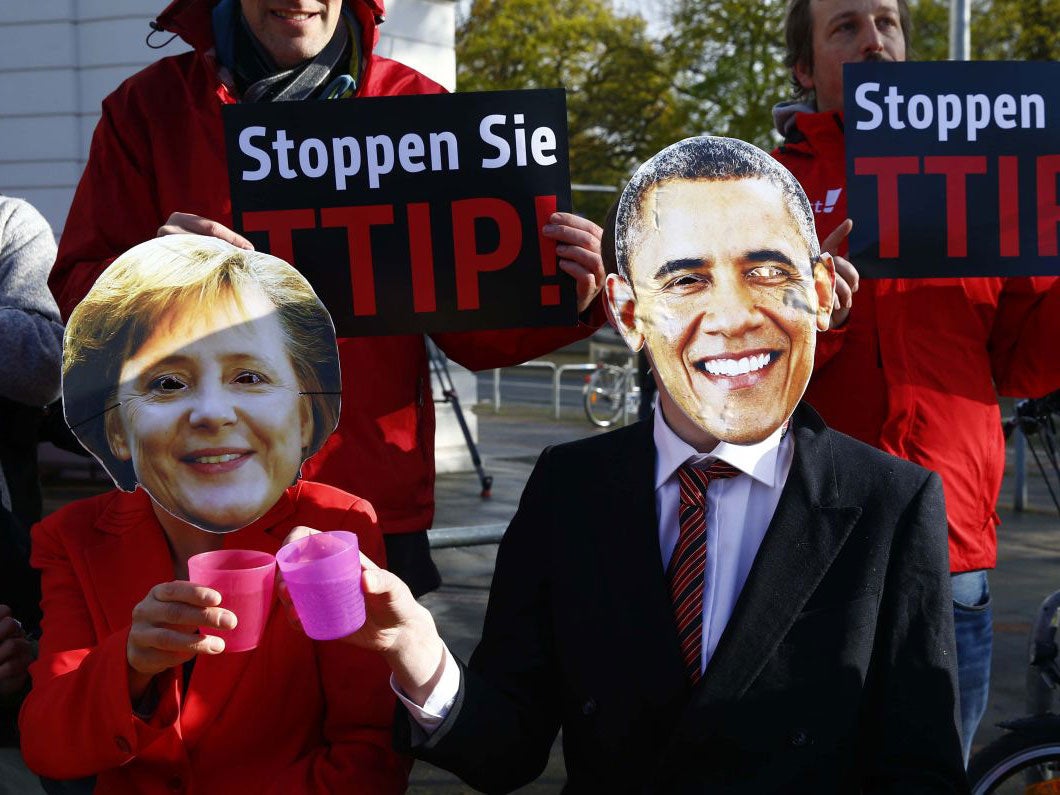It's not Jeremy Hunt imposing a junior doctors' contract that will destroy the NHS – it's TTIP
TTIP proponents have long argued that the NHS will not be affected by the deal. But the fact is that the UK’s healthcare services are, and always have been, on the negotiating table

Your support helps us to tell the story
From reproductive rights to climate change to Big Tech, The Independent is on the ground when the story is developing. Whether it's investigating the financials of Elon Musk's pro-Trump PAC or producing our latest documentary, 'The A Word', which shines a light on the American women fighting for reproductive rights, we know how important it is to parse out the facts from the messaging.
At such a critical moment in US history, we need reporters on the ground. Your donation allows us to keep sending journalists to speak to both sides of the story.
The Independent is trusted by Americans across the entire political spectrum. And unlike many other quality news outlets, we choose not to lock Americans out of our reporting and analysis with paywalls. We believe quality journalism should be available to everyone, paid for by those who can afford it.
Your support makes all the difference.Pressure to push through the controversial EU-US trade deal, TTIP, was ramped up this week as Barack Obama urged EU countries to push forwards with negotiations.
Obama’s statement comes in response to massive public concerns, both in Europe and the US, over the TTIP deal which seeks to ease trade between the EU and US by removing regulatory barriers. The problem is that these ‘barriers’ are, in many cases, important rules protecting our rights and safety in areas such as the environment, food, privacy, public health, workers’ rights and, most worryingly, public services such as the NHS.
TTIP proponents have long argued that the NHS will not be affected by the deal. But the fact is that the UK’s healthcare services are, and always have been, on the negotiating table, having received no exclusive exemption from talks.
TTIP supporters claim that TTIP will include a ‘carve out’ clause similar to that in CETA, the EU’s trade deal with Canada, which states that EU countries reserve the right to "adopt or maintain" measures excluding foreign companies from public health services. And a leaked TTIP document, published by the BBC in February, seems to confirm this.
But legal experts have shown that in practice this clause would have little effect against privatisation. And privatisation could be further locked in by the action of so-called ISDS tribunals – controversial behind-closed-door courts that allow private companies to sue governments over loss of profits.
Lest we remain in any doubt over the power of ISDS to sway the direction of governments, we just have to look at cases like the tobacco giant Philip Morris, which sued the Australian government over attempts to introduce plain cigarette packaging. And to see ISDS already at work against a public health service, there is the case of Dutch health insurer, Achmea, which successfully sued the Slovak government for bringing health insurance back under public control. Achmea won 20m euros in the case and, when the Slovak government decided to defend its sovereignty and refused to pay up, the Dutch firm, incredibly, seized government assets from bank accounts in Luxembourg, an act of piracy authorised by a Luxembourg court.
TTIP will include a form of ISDS so the same thing could happen to any country’s health service that accepts the deal, including the NHS here in the UK. If, we want a truly protected NHS, the only way is to negotiate a specific exemption within the text of the deal itself, something which the UK government has never sought to do.
And here we come to the real agenda behind TTIP, behind ISDS, behind Obama’s desperate statements and, sadly, behind a lot of the inner workings of the EU. The central agenda of TTIP is the deregulation of markets, allowing the relentless march to power of big corporations to continue unchecked. The fact that that march will trammel over public health, workers’ rights, environmental safety and democracy itself seems not to concern those involved.
But it should concern us, the citizens who will be affected, and it should inspire us to continue to fight against TTIP wherever and however we can.
Join our commenting forum
Join thought-provoking conversations, follow other Independent readers and see their replies
Comments